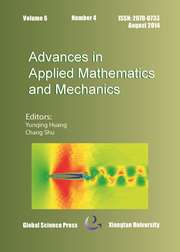Article contents
A Hybrid Method for Dynamic Mesh Generation Based on Radial Basis Functions and Delaunay Graph Mapping
Published online by Cambridge University Press: 28 May 2015
Abstract
Aiming at complex configuration and large deformation, an efficient hybrid method for dynamic mesh generation is presented in this paper, which is based on Radial Basis Functions (RBFs) and Delaunay graph mapping. Based on the computational mesh, a set of very coarse grid named as background grid is generated firstly, and then the computational mesh can be located at the background grid by Delaunay graph mapping technique. After that, the RBFs method is applied to deform the background grid by choosing partial mesh points on the boundary as the control points. Finally, Delaunay graph mapping method is used to relocate the computational mesh by employing area or volume weight coefficients. By applying different dynamic mesh methods to a moving NACA0012 airfoil, it can be found that the RBFs-Delaunay graph mapping hybrid method is as accurate as RBFs and is as efficient as Delaunay graph mapping technique. Numerical results show that the dynamic meshes for all test cases including one two-dimensional (2D) and two three-dimensional (3D) problems with different complexities, can be generated in an accurate and efficient manner by using the present hybrid method.
Keywords
- Type
- Research Article
- Information
- Copyright
- Copyright © Global-Science Press 2015
References
- 2
- Cited by


